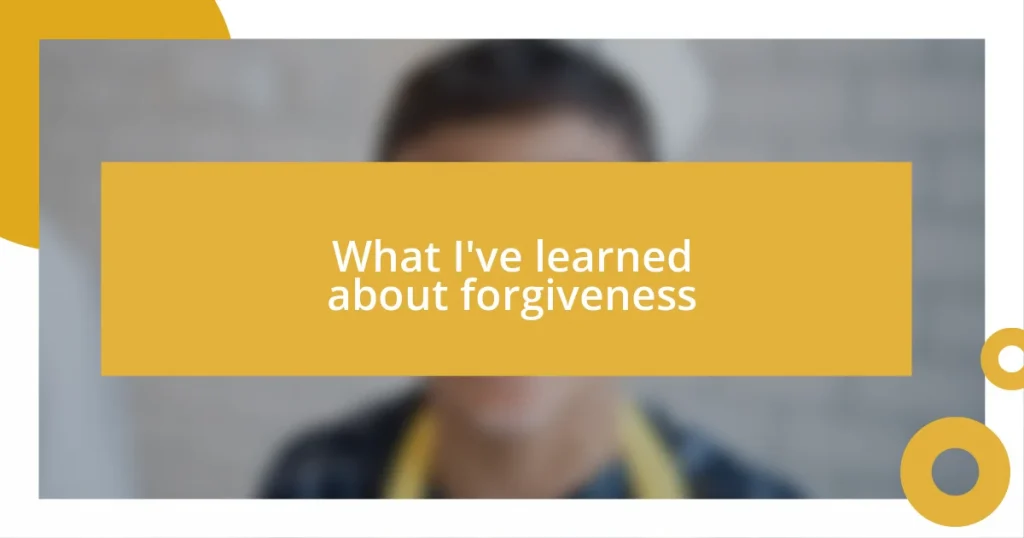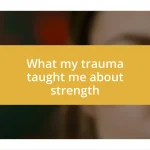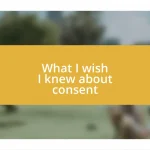Key takeaways:
- Forgiveness is a process of reclaiming personal peace, prioritizing emotional health over the hurt caused by others.
- Self-forgiveness is essential for emotional healing, transforming guilt into valuable lessons and positively impacting relationships.
- Integrating forgiveness into daily life involves intentional actions, empathy in conflict, and surrounding oneself with reminders that reinforce the practice of letting go.
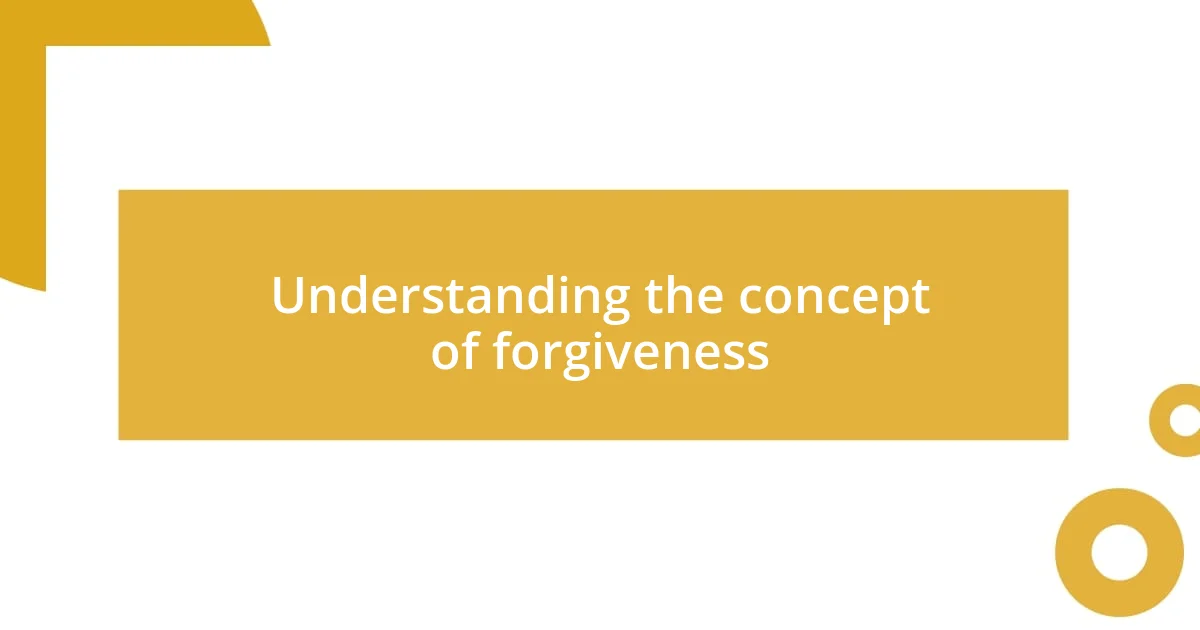
Understanding the concept of forgiveness
Forgiveness is often misunderstood as simply letting go of hurt or wrongs, but it’s so much deeper than that. For me, it has become a process of reclaiming my peace of mind rather than absolving someone else of their accountability. Can you imagine holding onto a grudge? It’s like carrying a heavy backpack filled with stones; the weight can be exhausting.
I remember a time when a friend betrayed my trust. I spent weeks replaying the event in my mind, drowning in anger and sadness. But in that reflection, I found a question that changed everything: What would it feel like to let this go? Through this introspection, I learned that forgiveness isn’t about excusing the behavior, but about freeing myself from the chains of resentment.
Understanding forgiveness means recognizing that it’s a gift, not just to others, but also to ourselves. When we forgive, we choose to prioritize our emotional health over our hurt. So, how do we break the cycle of pain? It starts with a shift in perspective, where we replace bitterness with understanding, allowing healing to take root.

The importance of self-forgiveness
Self-forgiveness is a critical step in the journey towards emotional healing. I’ve often found that the hardest person to forgive can be ourselves. I recall a period in my life when I made a series of poor decisions that hurt those I loved. Carrying the weight of guilt felt like a relentless storm cloud overhead. It dawned on me that the first step towards lifting that cloud was to practice self-forgiveness. When I slowly began to accept my imperfections, I found a sense of freedom that allowed me to grow.
It’s fascinating how forgiving yourself can reshape your entire perspective on past mistakes. I remember a moment where I wrote a letter to my younger self, expressing compassion and understanding for the choices I made. In that act, I found a powerful release from regret. This process transformed my feelings of guilt into valuable lessons, making me more resilient. Self-forgiveness isn’t about saying that our mistakes are okay; it’s about recognizing our humanity and learning from our experiences.
Lastly, self-forgiveness creates a ripple effect that can positively influence our relationships. When you’re at peace with yourself, you can engage more authentically with others. I’ve witnessed how my newfound understanding of self-forgiveness allowed me to connect better with friends and family. I noticed that as I let go of my critical self-judgment, I became more empathetic and supportive towards others’ struggles as well. This journey has taught me that self-forgiveness is not just a personal gift but a way to enrich the lives we touch.
| Aspect | Self-Forgiveness |
|---|---|
| Emotional Impact | Reduces guilt and shame |
| Relationship Effects | Enhances empathy in interactions |

Steps to forgive others
Learning to forgive others requires intentional steps that can guide you through the process. One of the first things I discovered is the importance of acknowledging your feelings. When I faced a situation where my trust was broken, I realized I had to fully confront my emotions—anger, disappointment, or even sadness. Only by validating these feelings could I begin the journey toward forgiveness.
Here’s a simple list of steps that may help you forgive others:
- Recognize your feelings: Take time to understand and accept how the situation has affected you. Writing them down can sometimes offer clarity.
- Reflect on the situation: Consider the circumstances that led to the wrongdoing. Why did the person act that way? Empathy can emerge from understanding their perspective.
- Decide to forgive: This step requires conscious choice. I remember when I decided to let go of the anger I harbored; it felt like shedding a weight I didn’t even know I was carrying.
- Communicate if possible: If it feels right, express your feelings to the person involved. I found that sharing my feelings, even in a letter, helped in releasing resentment.
- Set boundaries: Forgiveness doesn’t mean allowing the same hurt to continue. I learned the importance of establishing what I would and wouldn’t tolerate moving forward.
- Move forward: Focus on your healing journey. Engage in activities that bring you joy and connect you with supportive people. Each step taken toward freedom from resentment can truly transform your emotional state.
Remember, the process of forgiveness is unique for everyone. Take it at your own pace, and honor your journey.
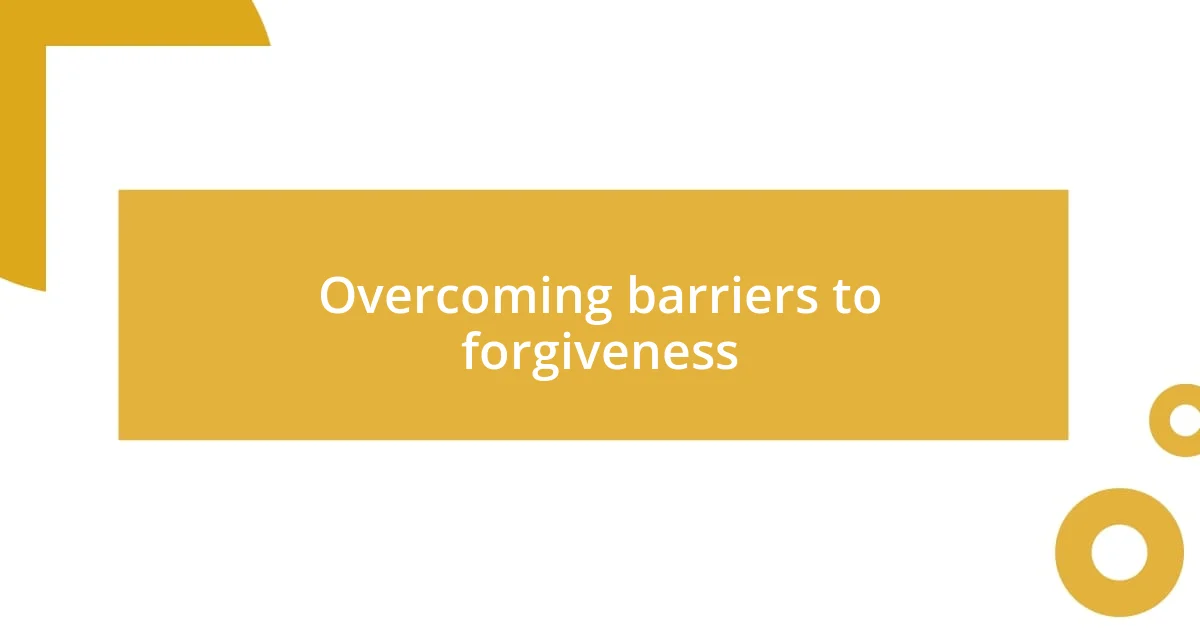
Overcoming barriers to forgiveness
It’s easy to get stuck when it comes to forgiveness, especially when you’re still feeling the sharp sting of betrayal or hurt. I recall struggling to forgive a friend who had let me down during a critical time in my life. I realized that my pride was one of the biggest barriers. Why was it so hard to let go? In that moment, I knew I had to choose vulnerability over resentment.
Another barrier I faced was the fear of losing my narrative. Sometimes, clinging to our pain can feel like holding onto a part of our identity. I remember battling with the idea that forgiving meant erasing the past. But as I worked through my feelings, I discovered that forgiveness isn’t about forgetting; it’s about freeing myself from the chains of anger and bitterness that had bound me for far too long. I found that by embracing forgiveness, I could rewrite my story with resilience and grace rather than victimhood.
Creating emotional space is essential, too. I started practicing mindfulness as a way to observe my thoughts without judgment. It gradually helped me to differentiate between my pain and my movements toward healing. I often ask myself, “What can I learn from this?” This question became a turning point, shifting my focus from the hurt to the growth potential within it, ultimately making the act of forgiving feel like a step forward rather than a defeat.

Benefits of practicing forgiveness
Practicing forgiveness has profoundly altered my emotional landscape. For instance, I once held onto resentment for a colleague who undermined my ideas at work. I was surprised to find that when I chose to forgive, not only did my anxiety dissipate, but I also felt a renewed sense of clarity and purpose. Isn’t it interesting how letting go of negativity can actually open doors to more positive emotions?
Moreover, embracing forgiveness often leads to better relationships. After I made the decision to forgive my friend for a misunderstanding, I noticed our bond grew stronger. It was like our friendship was given a fresh start, free from the weight of past grievances. Isn’t it remarkable how forgiveness can serve as a catalyst for connection rather than division?
Finally, practicing forgiveness promotes personal well-being. I’ve learned that it can decrease stress and improve mental health. One day, while meditating on my experiences, I realized that forgiving not only frees the other person; it also liberates me from the emotional baggage. It felt like a breath of fresh air, allowing me to focus on what truly matters in my life. How could something so powerful be so simple?
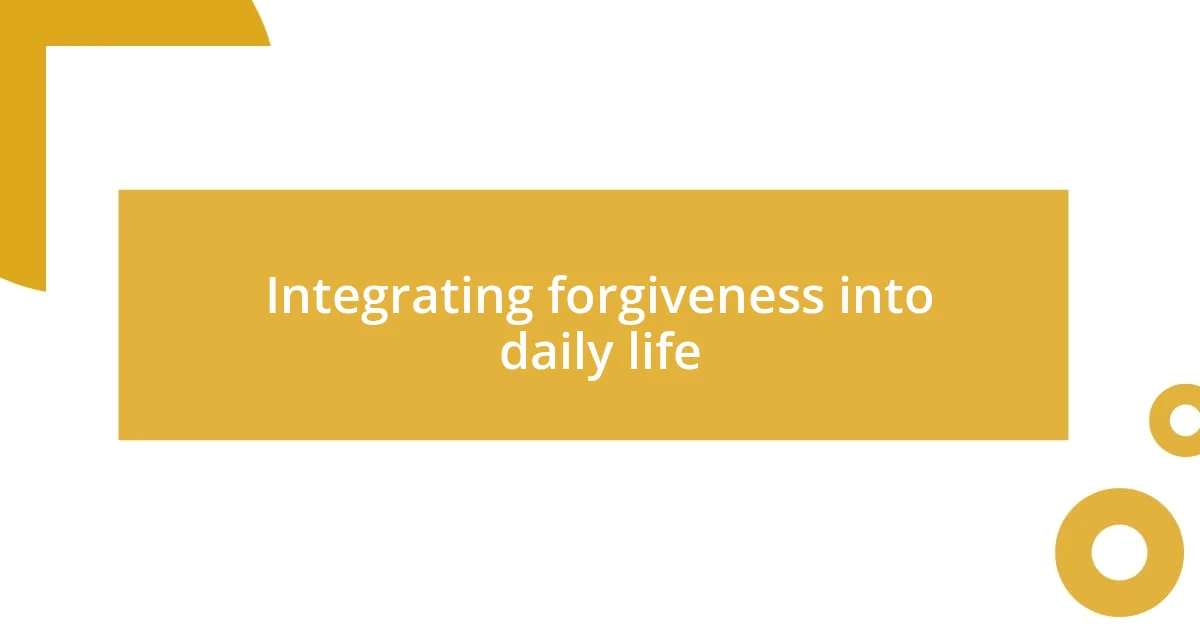
Integrating forgiveness into daily life
Integrating forgiveness into daily life can feel daunting at first, but it starts with small, intentional actions. I’ve found that incorporating simple forgiveness practices—like writing down things I’m struggling to forgive—can be incredibly liberating. This exercise not only clears my mind but also solidifies my intent to let go. Have you ever tried jotting down your thoughts? It’s a cathartic experience that can pave the way for deeper reflection.
One of my go-to strategies is to cultivate a forgiving mindset during moments of conflict. I remember a time when a misunderstanding with a family member nearly spiraled into a heated argument. Instead of reacting impulsively, I paused and reflected on the love we share. This simple shift allowed me to respond compassionately rather than defensively. It’s fascinating how choosing empathy over anger can transform a situation, isn’t it?
I also recognize the importance of surrounding myself with reminders of forgiveness. For instance, I hung a small note on my mirror that reads, “Forgiveness is freedom.” Each morning, as I prepare for the day, I’m reminded of my commitment to this principle. How often do we forget our intentions in the hustle of daily life? These small cues can anchor us in our journey toward forgiveness, making it an integral part of who we are.









